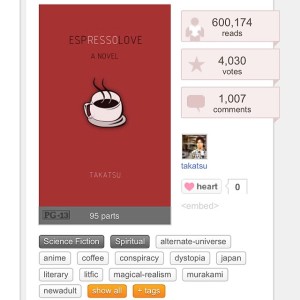Snow has hit Toronto. Mid-November, winter has begun. And it won’t be pretty, just like last year. Winter ought to be a season of hibernation, and human beings ought to be in accordance to the natural laws and nature, yet the world tries to be too busy these days. But at least we can pick up a cup of hot tea or coffee and snuggle up with our writing and reading. And if you’re like me, you can head off on vacation in December. I will be heading to Singapore, Hong Kong, and Tokyo once again. Here are some quick aggregated updates about my life as a writer at the moment. I was part of a big interview and writing tips campaign, and started off a few new writing projects: poetry and a travel memoir.
Interview on web TV series Small Empires
As I mentioned months ago, I had the honour of participating in a documentary series hosted by Alexis Ohanian (founder of Reddit) and The Verge covering start ups. I was interviewed and clips are throughout this episode on Wattpad that has just aired! Check it out. It was a fantastic experience.
http://www.theverge.com/video/2014/11/18/7241123/can-wattpads-diy-writing-empire-survive-amazon
Wattpad Writing Tips
I had the honour of contributing to the Wattpad #JustWriteIt NaNoWriMo Writing Guide. I share about the collective, the journey of self-discovery as writers and the literary technique of omission. Check it out! The full article: http://www.wattpad.com/78596373-just-write-it-guide-day-20-power-of-omission
The video:
Book Updates
Espresso Love reached two milestones recently: 600,000 reads and ranking #3 and #9, breaching the top ten charts!
Secondhand Memories, the pioneer English cell phone novel, is also officially nearly ready to be released! We are on proof copies now. The interior formatting is absolutely phenomenal and is very innovative and unique. It doesn’t look like a book of poetry, and not like a normal prose novel either. We have spent lots of time on the graphic design work and I am absolutely excited to let everyone know when it’s available!
New Projects
 Your Hands, Infinity: A Collection of Poetry
Your Hands, Infinity: A Collection of Poetry
A collection of poetry for the Soul, for the Spirit, of the Cosmos, and of the Universal, of the Divine and our Consciousness, of a Friend and a Lover, to open a window in the heart and set ourselves free. Having been inspired by many visionary poets throughout history, of both grand prophetic stature and of infinitesimal quiet beauty, written by this stumbling poet, helplessly out of practice and needs practice. He searches his soul and seeks enlightenment.
Title is a homage to William Blake. “Hold Infinity in the palm of your hand / And Eternity in an hour”
 Nights in TOKYO: A Travel Memoir
Nights in TOKYO: A Travel Memoir
A combination of a novel, a memoir and a travelogue, both fiction and non-fiction, a globe-trotting adventure full of sentiment, music, low budgets, trains, encounters and lifestyle, the author confronts his memories – and the miracles – on the page, and embarks on a new trip to celebrate Christmas in Japan in 2014. This is a flawed attempt at aligning the past from two years ago and the present: the musician, the dreamer and the writer, the philosopher, together in one place. Follow his adventures in Japan, and within the soul. Based 100% on true experiences. Keep an eye out for attached photo and video content
Writing Tips
Here is a copy of the Wattpad Writing Tips article 🙂
Whenever we open a book, we are entering someone’s consciousness (or subconsciousness). They’ve poured their mind, onto the page. And when we enter this new realm of theirs, we are coming with our own unique upbringing, background, ideas, struggles, feelings, instincts, memories, education: our own subjective perception. It is a collaborative process, the convergence of two – the reader and the writer.
As writers – or artists of any kind – we aspire to a noble duty! We are in the business of communication and subsequently, inspiration. Be proud! Stand bold with dignity! You matter. As soon as you begin to put words on a page, we have the ability to influence and change lives, touch hearts and uplift souls. Ultimately, art is the life stream, the soul of this mundane world and can change the world.
Let me approach our writing process briefly from the literary angle.
In the same way we enter the author’s world in reading, we are entering our own self when writing – it is a journey of self-discovery. Art is never purely conscious – you may think all you want, but there are facets and parts of us that will project and slip into whatever we produce. The work is a part of us. Therefore, make use of your subconscious. During the writing process, let it bleed, tap into the flow, the current, tap into your instinct. Write what floats to mind. Immerse yourself, let the characters and settings come alive. Create an environment where that is possible – whatever you need, whether it be music, a quiet room, maybe a favourite book, a coffee shop or a ride on a bus. “Green”, which means, nurture, your creative intuition. Do not think too hard during the actual writing. Be in the moment, in a state of Zen meditation – like the art of the samurai.
Your conscious work should primarily occur outside of your actual writing. Discover yourself. The better we know ourselves, the better the writing! What are your passions, convictions, values, beliefs? What would be the One Message you would convey to the world, if you can’t be here tomorrow? Our thoughts, identity and so on, will change as we grow – as will our art – but for now, what we have to say now, will be what’s important. Then, practice, hone your skills until you are confident in your writing – good days or bad days. Read widely, and into every aspect of humanity, research, plan and design. Oscar Wilde once asked his teacher why he had economy texts on his table. Literature truly is a reflection of life and of humanity. To me, the most beautiful thing about literature is that it is humanity. I study it as my major because it reflects everything in life from history, politics, philosophy, psychology, economy, social issues, archetypes, identity, spirituality, myths, the cosmos – all of it, all at once. And we are connected to this collective pool of all human consciousness and wisdom, – yes, connected to Homer, Dante, Blake, Shakespeare: some of them have changed how we think entirely! – and we are a part of this! Not only in absorption and receptivity, but we contribute to it ourselves. Isn’t that a wonderful feeling? Harness this immense energy. All of these things become a part of us, part of our development, a part of our instinct. It will flow and we will draw from this when we write.
That said, onward, I would like to explore a literary technique. Letting your message come through isn’t by writing an essay thesis and beating the reader over the head with a bat. It is most powerful through the undercurrents, the subtext. The unsaid. Master writers throughout literary history are, hand in hand, masters of omission – some of my favourite authors: Haruki Murakami, Yasunari Kawabata, Ernest Hemingway, Don DeLillo, Raymond Carver, Franz Kafka, George Orwell, J.R.R. Tolkien. If we discuss description, it is actually uncomfortable for the reader to receive too many heightened sensory details without necessity or reason. Human beings do not realistically notice or process that much information at a time. In the heat of a battle, everything may be blurry visually, maybe they can only make out tactile feelings of sweat on their face – soldiers in some war situations might actually not even notice they’re injured in the moment. Perhaps it feels like a disembodied dialogue because only sound is coming to the character during a focused conversation at a coffee shop – he wants to give her words all his attention. Perhaps at a rock concert, there is almost no sound because it is so loud, and all the person can process are the visuals. Perhaps in grief after the death of a loved one, the narrator may be in a state of shock, and everything resonates dull, muted, empty, hollow, haunting – the description should convincingly match that.
But also omit to create enigma and ambiguity in meaning and multidimensionality. Punch holes through your work so you can leave room for readers to interpret from different angles and fill in the gaps. Kafka’s entire novel, The Trial has a whole plot based on ambiguity – what exact crime was he convicted of? No one knows. It could’ve been anyone. It is a collaborative process with the reader. As they read, they re-create the story in their minds – they experience it. Let them. This will encourage personal engagement, and provoke thought and realizations. Readers will see themselves in the story, rather than being told something or observing somebody else.
A trick that many great writers will use is to omit the significant aspects (most of the time, it’s too obvious and predictable anyway) and call to attention seemingly originally insignificant details, hopefully something unique, and discreetly repeat it throughout the work to create unity, but also symbolism.
William Carlos Williams’ famous Imagist poem:
“so much depends
upon
a red wheel
barrow
glazed with rain
water
beside the white
chickens.”
Think like haiku sometimes. Readers immediately wonder, what does that mean? Why was it important? Why didn’t I notice this before?
Then give it some life – as if they are characters themselves. The setting, for example, can seem intimidating and oppressive, or liberating and pleasant. Use atmosphere, personify it, slightly. Add suggestions that, maybe, there’s more than meets the eye. If it’s an empty chair, maybe it’s longing for someone to fill it, reflecting the character’s mindset without needing to state it, or maybe it triggers a distant memory – leave a little hint somewhere in your writing, just a slight something. The way you suggest and imply will make a huge impact. Provide a painting for the readers to ponder over; don’t hit them with a full propaganda commercial. It will carry depth because there’s a gap of possibility, but also will help people notice things they don’t usually. It gives meaning and a new perspective to things around us in life, and to the reader’s life too. It creates a meditative moment of contemplation. It can inspire. This will draw the reader into the experience, into your consciousness and into their own. Readers are not dumb; if given room, people will think for themselves, and love the process – and your work.
Of course, there is much more to writing, the soul of writing, the purpose of writing, the process and the techniques – but I hope that briefly helped in some way. Be inspired, good luck with your writing and your journey ahead!



